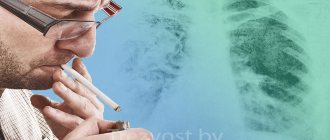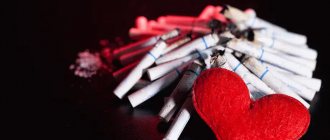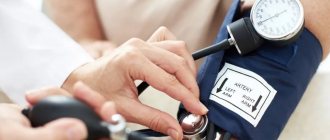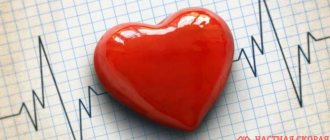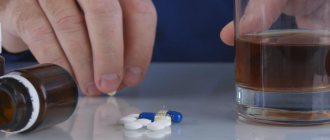Smoking is one of the most significant risk factors for the development of diseases such as heart attacks, angina, arrhythmias and other diseases of the cardiovascular system.
Most people consider smoking to be the main cause of breathing problems and lung cancer. This is true, but smoking and the heart are also closely related, which is the main cause of heart disease.
So what happens to your heart when you smoke?
The main active component of smoking, which negatively affects the heart and blood vessels, is smoke, the main component of which is nicotine. Nicotine entering the circulatory system
, causes a sharp release of adrenaline - the “stress hormone”, due to which
the walls of blood vessels contract, blood pressure rises, and the heart rate increases by 20-25%.
Due to this, the muscle contracts faster and requires more oxygen.
Carbon monoxide, which is contained in cigarette smoke
, significantly
reduces the amount of oxygen supplied to the heart
and other internal organs, which leads to oxygen starvation, reducing the vital resource of the smoker’s heart.
Increased blood clotting
also occurs due to smoking.
This disease causes the formation of blood clots in the cavity of the heart and the lumens of blood vessels.
The detachment of a blood clot causes events such as cerebral stroke, myocardial or lung infarction.
Two days after being discharged from Regional Hospital No. 1, I was taken by ambulance with heavy bleeding to the First City Hospital, to the surgery department. The doctor on duty, Andrey Alekseevich Kulakov, examined me and decided to prepare me for an emergency operation. His instructions were quickly, clearly and most importantly skillfully carried out by nurse Alexander, nurse Anna (medical university students) and sister-hostess Anna Vladimirovna, who was on duty that evening. Literally in a matter of minutes they undressed me, put in the necessary IVs, and decided on a bed. And very soon I found myself in the operating room. Andrey Alekseevich and his assistant did everything that was needed. Very quiet and good surgeons. Thank you! After the operation, they also did everything necessary (droppers, catheters, etc.). The next morning, an attending physician was appointed - Svetlana Viktorovna Yevtushenko. Very competent, knowledgeable specialist. Who will not only prescribe the necessary medications and procedures, but also with a kind word will reassure you and set you in a positive mood for a speedy recovery. Thank you for everything Svetlana Viktorovna! I would like to thank nurses Tatyana and Natalya, and guard nurse Tamara Sergeevna. Thanks to dressing nurse Olga Sergeevna, not only for her professionalism, but also for her sincerity. Sister-housekeeper Anna Vladimirovna spends the whole day busy with the affairs of the department - changing linen, helping the nurses, sending linen to be washed, etc. Thank you. You are a kind person! Thanks to all the nurses, I don’t mention them by name because I’m afraid I’ll miss someone and offend someone with inattention. Special thanks to the nurses on duty – nurses – students: of course, Alexander and Anna, as well as Kirill, German and Veronica. A little about everyday life. Linen is changed on time. The food is very good and tasty. For most patients it was enough. Of course, there were those who throughout their lives were on some newfangled diets or considered themselves blue bloods. Relatives brought food to them. Most, on the contrary, called and said that food should not be brought to them. Now about the disadvantages. The first is cockroaches, there are a lot of them. The second characteristic of almost all hospitals in Vladivostok except PKOD is the lack of drinking water. There is boiling water, but no cold drinking water. We somehow got out of the habit of drinking tap water. Why not do it like in the Oncosurgical Department of PKOD, there is a filter there, like we install at home under the sink. This is such a chaotic review. With all respect, Andrew.
Suprun Andrey
Smoking and heart disease
The harm of smoking for people leading a healthy lifestyle is an obvious concept. What can we say about heart patients, whose illnesses force them to take care of themselves and their blood vessels in order to prevent life-threatening complications. Fortunately, not everyone around us suffers from heart disease, which means they can sometimes take liberties with their behavior and lifestyle. 1-2 cigarettes a day, “for company”, not every day - evil or forgivable liberty? Today we’ll talk about the absolute dangers of smoking for the heart and blood vessels, regardless of the number of cigarettes smoked per day and the number of years lived.
Sad statistics of smokers
According to statistics, one cigarette smoked shortens your life by ten minutes. If we transfer these figures to “heavy” smokers, the lost weeks, months and years plunge us into panic. The reason lies in the harmful effects of tobacco smoke on the heart and an increased risk of diseases of the cardiovascular system by 3-4 times compared to non-smokers. The risk of sudden death in smokers is several times higher compared to people leading a healthy lifestyle.
If you smoke, you will get a myocardial infarction!
Smoking seriously disrupts the smooth functioning of the cardiovascular system. The result of many years of smoking is a chronic (constant) deficiency of oxygen in the blood, accelerating the progression of atherosclerosis.
The absolute evil of cigarettes lies in their smoke, or more precisely, its component - nicotine, which disrupts the nutrition of the vascular wall, increases the pressure inside the vessels and increases the content of catecholamines in the blood - special substances that accelerate the pulse and narrow the lumen of the vessel. The heart is especially susceptible to this influence. Lack of oxygen in the blood prevents the heart from working like a clock and reduces the release of blood, and with it nutrients, to all organs and tissues. Nicotine causes blood to become thicker, and blood clots settle faster on the walls of blood vessels, blocking their lumen. The rupture of a blood clot in the vessels of the brain inevitably leads to a stroke, and in the vessels of the heart - to a heart attack.
The risk of a heart attack increases in proportion to the number of cigarettes smoked. The longer the length of smoking, the greater the likelihood of a heart attack.
From coronary heart disease to sudden death
Long-term lack of oxygen in the heart vessels leads to coronary heart disease. Together with prohibitively high blood pressure and high cholesterol levels in the blood, this disease increases the risk of a heart attack, and with it sudden death, by 10 times compared to healthy people.
The reason is that after inhaling tobacco smoke, after a few minutes, blood pressure rises, blood vessels narrow and the heart needs to expend twice as much effort to throw blood to the periphery. In addition, carbon monoxide contained in nicotine is an order of magnitude lighter than oxygen. When it combines with hemoglobin in the blood, the latter can no longer bind oxygen. “Unfortunate” hemoglobin is doomed to carry blood throughout the body that is poor in oxygen and rich in carbon dioxide, nitric oxide, cadmium, hydrogen cyanide and other harmful substances.
"Pectoris pectoris" or myocardial infarction
Another manifestation of the harmful effects of nicotine on the heart is angina pectoris or “angina pectoris”. It is a consequence of coronary heart disease. The disease manifests itself as pressing pain in the retrosternal region (middle of the chest) with pain radiating to the left arm, neck, and lower jaw. A prolonged attack of angina pectoris is fraught with a sharp disruption of blood flow in the heart muscle and irreversible changes in it. If oxygen is cut off to the heart, beware of myocardial infarction! After all, a heart attack is nothing more than its death.
Smoking increases blood pressure and cholesterol
The release of catecholamines (stimulants of the cardiovascular system) in smokers leads to a constant narrowing of the lumen of the vessel and an inevitable increase in blood pressure, which, moreover, is difficult to treat. Moreover, changes occur already after the first cigarette smoked!
In smokers, the level of “bad” cholesterol in the blood is increased, which leads to the rapid growth of atherosclerotic formations (plaques) on the walls of blood vessels. Atherosclerosis is a systemic disease, it affects the entire body: the brain is fraught with stroke, the heart is fraught with myocardial infarction, the vessels of the neck are also stroke, the kidneys are with uncontrollable blood pressure numbers, the legs are chilly, cold, the sensation of “crawling” goose bumps up to the death of the fingers.
Today, a number of scientific studies have proven that the same changes occur in the blood of smokers as in persons who have suffered a myocardial infarction.
Do not poison your family and friends with tobacco smoke!
Smoking is harmful not only to the smokers themselves. A person who smokes puts his surroundings at risk: family, colleagues, neighbors, passers-by. Passive smoking (tobacco smoke inhaled by non-smokers) can cause chronic diseases in them: shortness of breath, asthma, high blood pressure, cancer and a number of heart diseases. Scientists have proven that about 35 thousand non-smokers die annually from heart attacks due to smoking and the environment polluted by it.
Think about it before it's too late!
A person who quits smoking feels a surge of strength and energy within a few hours. His mood improves, his blood pressure returns to normal, his blood moves faster, delivering precious oxygen to all cells. Thoughts become clearer, and with them creative ideas and plans suddenly appear. This state cannot be exchanged for “gray” everyday life.
The question “Should I quit smoking?” doesn't need an answer. If you are responsible for the people who are dear to you and who are dear to you, care about their health and want to live happily ever after with them, you will not waste your time on trifles. Buy a bike, lose excess weight, and finally bring harmony into your life. Then moments of happiness spent in the circle of family and friends will make you forget about everything in the world.
Author: cardiologist at the clinic
Irina Lutik
22.05.2018.
References:
- Guide to addictionology / Axelrod B. A. et al. / ed. V. D. Mendelevich. - St. Petersburg: Speech, 2007.
- Information technology for liberation from alcohol and nicotine addiction, depression / M. A. Tetyushkin / “LitRes”, 2014.
- Geppe N. A. Tobacco smoking in children and adolescents: impact on health status and prevention // Practical Pulmonology. – 2007. – No. 3. – P.15-19.
- Nicotine addiction / (psychoactive addictions) / [comp. N. N. Boyko]. – Ed. 2nd, rev. and additional / Moscow: Native Country, 2009. – 198, [1] p. : ill., table. (Russian Security).
Article verified by an expert
Terekhova Anna Vladimirovna
psychologist-consultant on socio-psychological work with addicted clients and their families. More than 10 years of experience.
Similar articles:
Harmful effects of alcoholism
Causes and understanding of the formation of codependency
Addiction to nasvay
Consequences of drug addiction
How do drugs affect the body?
How to deal with it
To cope with the problem and get rid of it forever, you need to quit smoking. It is definitely worth reducing the overall load on the heart muscle. Under no circumstances should you run, lift weights, or spend a lot of time in the gym.
Many patients complain that their heart periodically hurts; what to do about it, the doctor will tell you. It is worth making an appointment with a cardiologist and undergoing a series of diagnostic measures. If the doctor insists on taking a number of medications, nitroglycerin, for example, you should follow these recommendations.
Features of blood circulation in the brain during smoking
The cells of the central nervous system are the most sensitive to thickened blood and low oxygen content.
Against this background, patients develop:
- Headache.
- Noise in ears.
- Deterioration of vision.
- Memory loss.
- Weakness and decreased performance.
All these signs are a consequence of hypertension and thrombotic complications.
Over time, symptoms intensify and patients develop:
- Transient cerebrovascular accidents.
- Strokes.
- Encephalopathy.
- Dementia.
Lethal dose of nicotine for humans
The lethal dose for humans is 0.5 – 1 milligram of nicotine per kilogram of weight.
When smoking one cigarette, a person receives approximately 1 milligram of this substance.
When nicotine intoxication occurs, the prognosis depends on the following factors:
- dose taken,
- age of the victim,
- general health, presence of concomitant diseases,
- duration of intoxication (before medical assistance is provided).
Signs of acute nicotine poisoning
When consuming large amounts of nicotine in a short period of time, acute intoxication occurs due to a sharp increase in the level of toxins in the blood. In this case, the person experiences the following symptoms:
- pale skin;
- unsteadiness of gait, loss of coordination;
- sudden jumps in blood pressure and pulse;
- increased sweating;
- pain in the abdomen, head, muscles;
- the appearance of convulsions, shaking hands;
- blue discoloration in the area of the nasolabial triangle;
- impaired vision, swallowing, speech.
If you suspect acute nicotine intoxication, you should immediately seek medical help.
Nicotine hit
If after smoking a person begins to feel dizzy, has nausea and the urge to vomit, breaks out in a cold sweat, and the skin becomes pale, it means that a nicotine kick has occurred. It can be caused by the following reasons:
- smoking several cigarettes in a row;
- smoking on an empty stomach,
- smoking immediately after a good night's sleep.
This condition has an extremely negative effect on the functioning of the entire body, especially the heart and brain. It can cause the development of hypertension, atherosclerosis, endarteritis or the appearance of malignant tumors.
CODING FROM SMOKING
What to do?
The only option to avoid the development of complications is to quit smoking. Special techniques and recommendations from doctors will help you overcome yourself:
- hypnotherapy;
- methods of self-hypnosis;
- psychotherapy sessions;
- symptomatic treatment;
- aversive therapy (inducing unpleasant sensations from tobacco smoke).
The use of nicotine substitutes (patches, chewing gum, electronic cigarettes) is not recommended. Typically, such methods begin to work almost immediately, but they only slightly ease withdrawal symptoms and do not help to quit smoking.
You can eliminate the effects of nicotine by following your doctor's recommendations. He will recommend effective treatment methods based on the diagnostic results. The following healthy lifestyle rules will help speed up your recovery:
- give up alcohol;
- exercise;
- spend more time in the fresh air;
- sleep 7-8 hours a day;
- make the right diet;
- be examined annually.
Smoking causes pain in the heart area. It is a consequence of the toxic composition of the cigarette. To avoid consequences, it is urgent to give up the bad habit using generally accepted methods. If complications arise, you will have to be examined. Based on the results obtained, the doctor will draw up a treatment regimen. It is advisable to combine it with compliance with the rules of a healthy lifestyle.
